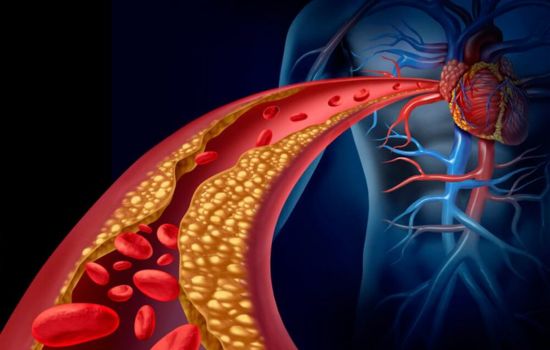Cholesterol is a waxy substance found in all cells of the body and is vital for several biological functions, such as the production of hormones, vitamin D, and bile acids, which aid in the digestion of fats.
However, when cholesterol levels are too high, they can pose serious health risks, especially to the cardiovascular system.
Controlling cholesterol levels in the body is essential for maintaining a healthy life and preventing heart disease.
In this article, we'll discuss how you can monitor and control your cholesterol levels, the consequences of not doing so, and how an app can help you simulate and monitor your cholesterol levels easily and effectively.
What is cholesterol and why is it important to monitor it?
Cholesterol is transported through the blood in two main types of lipoproteins: low-density lipoprotein (LDL) and high-density lipoprotein (HDL).
- LDL (bad cholesterol): LDL is known as "bad cholesterol" because it can build up on artery walls, forming plaques that block blood flow. This increases the risk of heart disease, heart attacks, and strokes.
- HDL (good cholesterol): HDL, on the other hand, is known as "good cholesterol" because it helps remove excess LDL cholesterol from the blood, transporting it to the liver for processing and elimination. Adequate HDL levels help reduce the risk of cardiovascular disease.
Maintaining the proper balance between LDL and HDL is essential for good cardiovascular health. Cholesterol should be within certain limits to avoid complications.
High cholesterol levels can be caused by factors such as an unhealthy diet, lack of physical activity, smoking, genetics, and medical conditions such as diabetes.
Consequences of having high cholesterol levels
If LDL cholesterol builds up in the arteries, plaques can form and narrow the blood vessels, a condition known as atherosclerosis. This condition can lead to several serious health problems:
1. Heart disease
High cholesterol is one of the main risk factors for heart disease. The buildup of plaque in the coronary arteries can restrict blood flow to the heart, increasing the risk of angina, heart attacks, and heart failure.
2. Stroke
High cholesterol can also increase the risk of stroke. If plaque blocks an artery in the brain or if a clot forms and blocks blood flow, an ischemic stroke can occur.
3. High blood pressure
High cholesterol can affect the elasticity of your arteries, which can contribute to high blood pressure. Hypertension is a dangerous condition that can increase your risk of a heart attack or stroke.
4. Kidney problems
When the arteries that supply blood to the kidneys narrow, blood flow to the kidneys can decrease, which can lead to kidney failure.
5. Peripheral arterial disease
High cholesterol can also affect the arteries that supply blood to the legs and arms, which can cause pain, weakness, and difficulty walking.
See Also:
- Apps to Detect Impurities in the Air
- Free Apps to Learn English
- Apps to Try Beard Styles
- The best music recognition apps
- Apps to Block Fraud Calls
How to monitor your cholesterol levels?
Monitoring your cholesterol levels is essential for making informed decisions about your health. While traditional blood tests performed in clinics or hospitals are a common way to assess cholesterol, technology has advanced, and mobile apps now make it easier and more accessible to simulate and track your cholesterol levels.
Next, we'll explore one such app, which can be helpful for consistently monitoring your cholesterol levels.
Regular cholesterol monitoring
The best way to keep your cholesterol under control is through regular checkups. This allows you to know your cholesterol levels and take the necessary measures before they become a serious problem. In addition to medical checkups, you can use apps to track your health daily.
Mobile apps allow you to enter your cholesterol and other health-related data, giving you detailed information about how your levels compare to healthy ranges.
Cholesterol simulator and how it works
Digital cholesterol tracking is easier than ever thanks to mobile apps. cholesterol simulator allows you to track your cholesterol levels and monitor your health habits to improve your overall well-being.
There are several apps that, in addition to simulating and monitoring your cholesterol, also offer information on diet and exercise to improve your results.
An application that has gained popularity in this field is the cholesterol monitoring appThis app allows you to enter your cholesterol levels and track your health continuously. Below, we explore how it can help you manage your cholesterol.
Features of the application to simulate cholesterol level
The application LDL: Cholesterol Tracker It's a useful tool for monitoring and managing blood cholesterol levels. Here are the app's main features and how it can benefit users:
- Simulation of cholesterol levels
The app allows you to enter your current LDL, HDL, and triglyceride cholesterol levels, and simulates how these levels relate to your overall health. This helps you get a clear picture of the amount of "good" and "bad" cholesterol in your system. - Health monitoring
In addition to simulating your cholesterol, the app provides a detailed record of your cholesterol levels over time, allowing you to see how your eating habits and exercise routine are affecting your cardiovascular health. - Personalized advice
Based on the data you enter, the app can offer personalized diet, exercise, and lifestyle advice to improve your cholesterol levels. For example, it may recommend increasing your consumption of fiber-rich foods or increasing your cardio workouts. - Graphic reports
The app offers easy-to-understand graphical reports that allow you to see your trends over time. This helps you make more informed decisions about your health. - Alerts and reminders
The app can send alerts or reminders so you don't forget to do your regular cholesterol checks or make lifestyle changes. - Tracking history
You can store all your past measurement data to compare and see any progress or decline in your cholesterol levels. This helps you maintain complete control of your health and discuss your results with your doctor.
Benefits of using the cholesterol monitoring app
Using an app to simulate and monitor your cholesterol levels has several benefits. First, it allows you to keep a constant record of your health without having to wait for regular doctor visits.
It also helps you stay motivated and focused on your health goals, as you can see the results of your dietary and exercise changes quickly and efficiently.
Additionally, the app makes it easier to communicate with your doctor, as you can share the data obtained for more accurate diagnosis and recommendations.
The apps also help raise awareness about the importance of maintaining healthy cholesterol levels, which is crucial for preventing serious diseases.
Tips for maintaining healthy cholesterol levels
- Maintain a healthy diet
Eating a balanced diet is essential to keeping cholesterol under control. This includes eating foods rich in fiber, healthy fats, such as those found in avocados and nuts, and avoiding trans and saturated fats. - Exercise regularly
Cardiovascular exercise, such as walking, running, or swimming, can help lower LDL cholesterol levels and increase HDL cholesterol. At least 150 minutes of moderate activity per week is recommended. - Avoid excessive tobacco and alcohol
Smoking and excessive alcohol consumption can increase bad cholesterol levels and contribute to cardiovascular disease. Quitting smoking and limiting alcohol consumption can help improve overall health. - Control stress
Chronic stress can negatively affect cholesterol levels and overall health. It's important to find ways to relax, such as meditation, yoga, or engaging in activities you enjoy.
Conclusion
Monitoring cholesterol levels is crucial for maintaining good cardiovascular health and preventing serious diseases.
With the use of applications such as LDL: Cholesterol Tracker, you can keep detailed track of your cholesterol levels, receive personalized recommendations, and effectively improve your health habits.
Maintaining a healthy lifestyle with a balanced diet, regular exercise, and stress management is the best way to control cholesterol and protect your heart.
By incorporating these tools into your daily routine, you'll not only improve your cardiovascular health, but you'll also feel more empowered to make informed decisions about your well-being.
Always remember to consult your doctor for a proper diagnosis and a personalized treatment plan.






